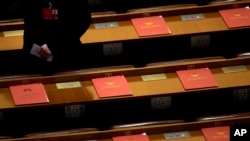A revised controversial law that seeks to harshly regulate foreign non-government organizations in China is under review by the country's lawmakers.
The revisions follow criticism from multiple foreign governments and civil society groups that the draft law was too vague and could severely limit the operations of social and environmental advocacy groups, as well as business organizations and academia.
The bill is among legislation including a new counterterrorism law and a draft cyber security law put forth by President Xi Jinping's administration in what it being viewed as a renewed crackdown on dissent.
Earlier drafts of the bill that have since been removed include restrictions such as limiting NGOs to five-year operations in the country, giving police broad latitudes to regulate activities and funding, and only allowing one office per organization on the mainland.
Deputy head of the National People's Congress Law Committee, Xu Xianming, told state media Xinhua since the number of NGOs has grown fast,"... and their activities intensified, it is necessary to have a law to regulate and guide their activities. The basic principle in drafting this law is to combine the regulation with service so as to facilitate NGO operations in China."





